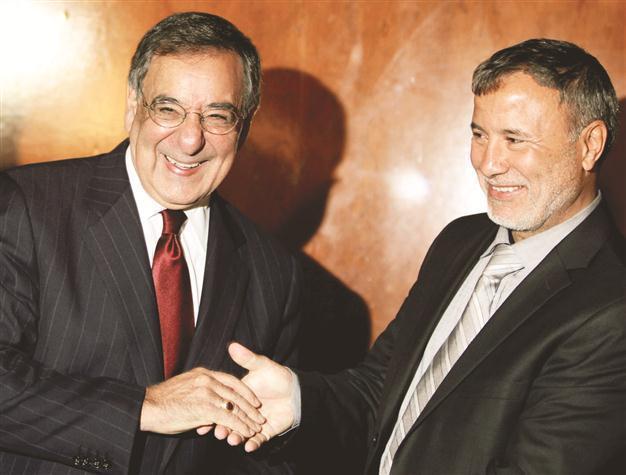Panetta warns Libya on al-Qaeda leverage
TRIPOLI - The Associated Press

Defence Secretary Panetta (L) shakes hands with his Libyan counterpart Juili. AFP photo
U.S. Defense Secretary Leon Panetta said “the torch of freedom” has passed to the Libyan people and he pledged during a historic visit to Tripoli that the United States will do all it can to help the country move toward democracy.But he and his Libyan hosts acknowledged the threat of Islamic militants gaining ground in this period of political uncertainty following the ouster and death of longtime dictator Moammar Gadhafi. Panetta and Libyan leaders identified challenges for the government now forming, including how to gain control of the militias that overthrew Gadhafi during an eight-month civil war.
During meetings with the Libyan leaders, Panetta expressed concern about al-Qaeda in the Islamic Maghreb militants gaining a foothold amid the chaos of an unfolding democracy. But they told him that the Libyan people will reject the terrorist group, said a senior defense official, who spoke on condition of anonymity because the discussions were private.
“This will be a long and difficult transition, but I have confidence that you will succeed in realizing the dream of a representative government,” Panetta said during a news conference with Prime Minister Abdurrahim al-Keib. “The torch of freedom that has passed throughout the centuries and now passes from nation to nation in the Middle East and North Africa burns brightly here in Libya. May it light your way to a future of peace, prosperity and freedom,” Panetta said.
Both Panetta and al-Keib expressed confidence that the fledgling government will be able to reach out to the militias and bring them together. “We know how serious this issue is,” said al-Keeb, “We realize it is not matter of saying ‘OK, put down your arms, go back to work or do what you want to do.’ We realize that there are lots of things that we need to be organized.” More broadly, Panetta said the revolts across the region represent a quest for sovereignty by the people, but they will all involve different approaches and challenges.
















